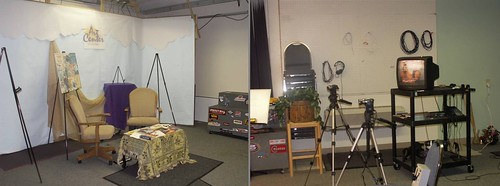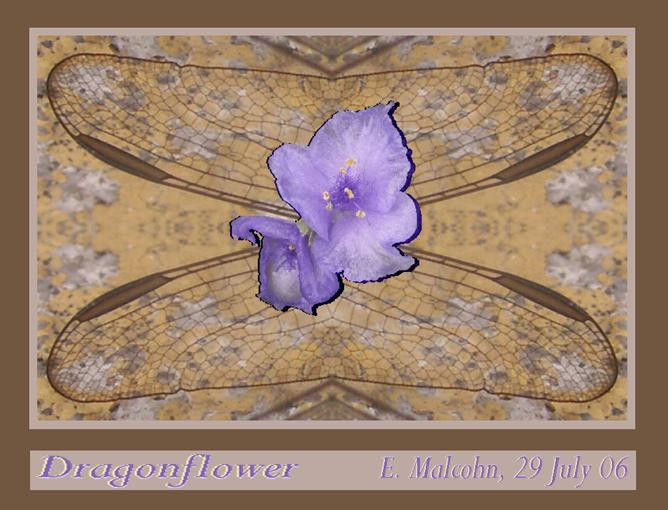Exposure

Mockingbird feather
On the latest preening and flexing of wings....
-- Randall Jarrell
-- Emile Zola
In many ways I put the above two quotes into practice: through writing, teaching, art, and advocacy. My appearance on local cable Thursday night, to talk about writing and about the Art Center of Citrus County, was another example. I had a blast -- I made new connections and was told I was very informative. Afterwards I received a call from someone who had watched the show and was looking for some writing guidance. I also spoke with someone looking for GLBT information, who had found me because I'm the contact person for our local PFLAG (Parents, Friends, and Family of Lesbians and Gays) chapter.

The studio at WYKE in Lecanto, FL, in mid-setup before "Creative Conversations". Click here for more image detail and on the photo above for more explanation.
But there are still some areas where I haven't taken the time or made the effort to express myself. I'm starting to remedy that. Because the more I express myself in whatever form, the more empowered and confident I become. I love public speaking and I do well in a performance atmosphere. But I can also be painfully shy at times and reserved almost to the point of strained formality. It's a weird combination to live with. The last time I worked at bursting out of my chrysalis I wrote letters of appreciation to composers whose work has helped fuel my writing -- knowing how thrilled I am when I receive positive feedback for my own creations.
I've bought and now keep a paper cutter handy, and have sent a couple of e-mails in response to articles I've read in the St. Petersburg Times.
On the 26th I read Joey Knight's portrait of athlete Tatyana McFadden in his article "Rolling Over Doubts." McFadden, a top-notch Paralympic competitor, had been born with spina bifida. She was adopted from a bleak Russian orphanage. Knight's story is mainly about 17-year-old Tatyana, including her outspokenness in gaining competitive access for disabled athletes. But his article also contains this paragraph:
"Eventually, Deborah adopted Tatyana and brought her to her Clarksville, Md., home, where she lived with partner Bridget O’Shaughnessy. In time, Deborah became 'Mom' and Bridget became 'Momma,' though Deborah is the only legally adoptive mother."
I sent Knight the following e-mail:
"I was impressed not only by your story of Tatyana McFadden's extraordinary courage, athletic excellence, and joie de vivre, but also by your mention of both her mothers. I remember a time not very long ago when such mention would never see mainstream print. Your succinct integration of that information into Tatyana's story presents her two-mother household without fanfare or sensationalism, and without judgment in any direction, but simply as a statement of fact. Like so many others, Tatyana has two loving and supportive parents. Hers both happen to be women.
"In a world (including the state of Florida) where such families are often discouraged, I wanted to thank you for reporting the full story."
(I've already written to my representatives -- both here and back in Massachusetts -- on the issues of adoption rights and marriage equality.)
Friday's newspaper included an article excerpted from Lisa de Moraes' column, "PBS's Lip-Reading Effort," which appeared in Thursday's Washington Post. The St. Pete Times' website doesn't include articles from other papers. Free registration on the Post's site might be required to view the column, though I was able to call up the URL after I had logged out.
The Times article contained the following:
"PBS will file papers next week in support of KCSM, a small public TV station in Northern California that was hit with a $15,000 fine for rerunning before 10 p.m. an episode of the Martin Scorsese documentary The Blues.
"In the episode, jazz musicians and a relative of a record industry executive use two words that the FCC has deemed unspeakable on the air between 6 a.m. and 10 p.m.
"The FCC, in response to a single complaint, slapped the fine on KCSM, which, PBS execs say, broadcasts no children's programming at any time. Which presumably means not too many children watch the station."
The article quotes from PBS chief Paula Kerger, who said, "When you have stations whose operating budgets in some cases are only a couple million dollars, even, frankly, the old fines ... were daunting. The fines now would put stations out of business."
I sent the following e-mail to FCC Chairman Kevin J. Martin and its four Commissioners:
"I was prompted to write to you after reading an article concerning the fine levied on KCSM ("PBS chief: Profanity rules silence broadcaster," originally from the Washington Post and published in the July 28, 2006, St. Petersburg Times).
"I am a member of my local public television and radio stations, WUFT and Nature Coast 90, and have long valued public broadcasting. In my experience PBS and its affiliates provide an education and diverse perspectives invaluable to the American people. They help preserve and thereby strengthen the unique character of this country in a way that nurtures the public trust.
"Commercial television often uses sex and violence as artificial constructs aimed at titillating audiences in order to sell products. In contrast, the candid, real-life events presented on public television educate the public so that we know who we are, where we came from, and how we can use what we've learned to evolve as a people and as a nation. I believe such candor and truthfulness is in our country's best interests. To threaten or lose that voice imperils America's highest aspirations and the qualities we seek to present to the rest of the world.
"I implore you to reconsider your profanity rules with respect to public broadcasting and to work out a solution that keeps that broadcasting viable and supported. Thank you for your time and consideration."
I have changed my desktop background to be both a message and an inspiration to me. Prior it was a picture of a rhinocerous, identical to the printout I have taped above my desk that also contains the quote, "A writer must have the skin of a rhino." It's a good reminder to me as I try to break back into print.
Since I've got that printout hanging in clear view, my desktop background is now a sand painting, to remind me of impermanence and acceptance thereof, and to press ahead anyway. I'm in fine health, so no problems there. But as part of overcoming my own hesitancies I've been remembering a young woman who has probably been dead for years. She had cystic fibrosis. She was a top-notch student and a very aggressive journalist when I worked in a public relations office 20 years ago. The office also served a watchdog function: we had to regulate contact between personnel and the press.
The young woman was irrepressible. She regularly pushed our limits and, frankly, could be a royal pain in the butt. But we all admired her tenacity, her take-no-prisoners attitude, and her zest for life. She spent part of every morning standing on her head to get the phlegm out of her lungs before she went to class. She was not expected to live past 30.
She used her time in this world well. I've been thinking of her as I work to overcome my own self-censorship, my shyness, and my ability to be intimidated. Even when I myself have sometimes been called intimidating.
I've had the Zola quote on my wall for years. I saw the Jarrell quote for the first time yesterday on the Florida State Poets Assn.'s online forum. In addition to its metaphor for creative inspiration, I see in the Jarrell quote a mandate to embrace risk. And, when (not if) that risk results in a serious blow, to recover, persevere, and overcome one's fear of successive blows. Because the blows mean that one is having an impact.
The guidance below is sung, very powerfully, on my recording of Steve Reich's composition The Desert Music. It is taken from William Carlos Williams' poem "Theocritus: Idyl I":
"Begin, my friend,
for you cannot,
you may be sure,
take your song,
which drives all things out of mind,
with you to the other world."
for you cannot,
you may be sure,
take your song,
which drives all things out of mind,
with you to the other world."

Components: the wing of a male Eastern Pondhawk on faded paint, and a flower found by the "post office pond."











1 Comments:
I don't think I've ever seen a mockingbird or a nightengale. We have woodthrush here. I only know because I hear them.
I do believe that the more you share what you do, the more it grows in you!
Post a Comment
<< Home